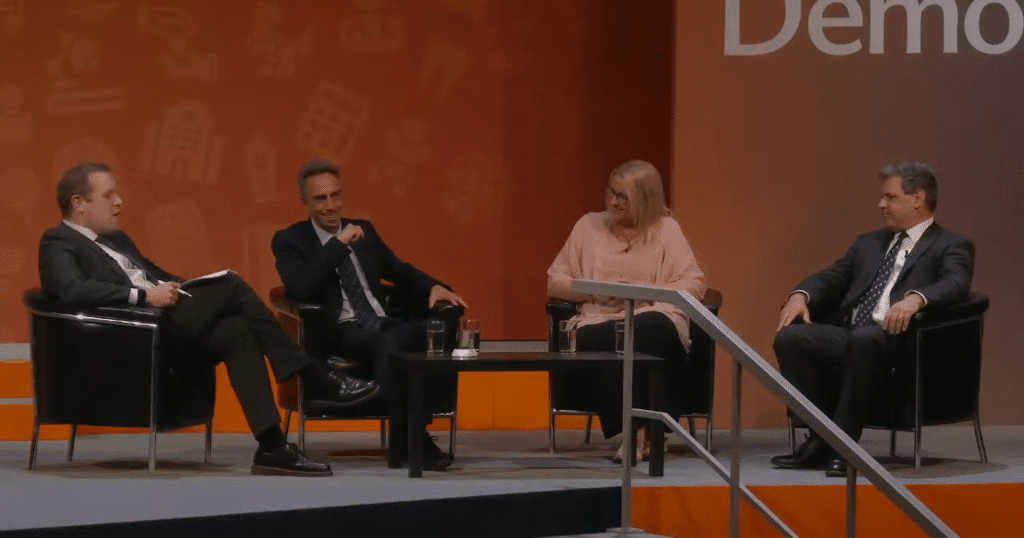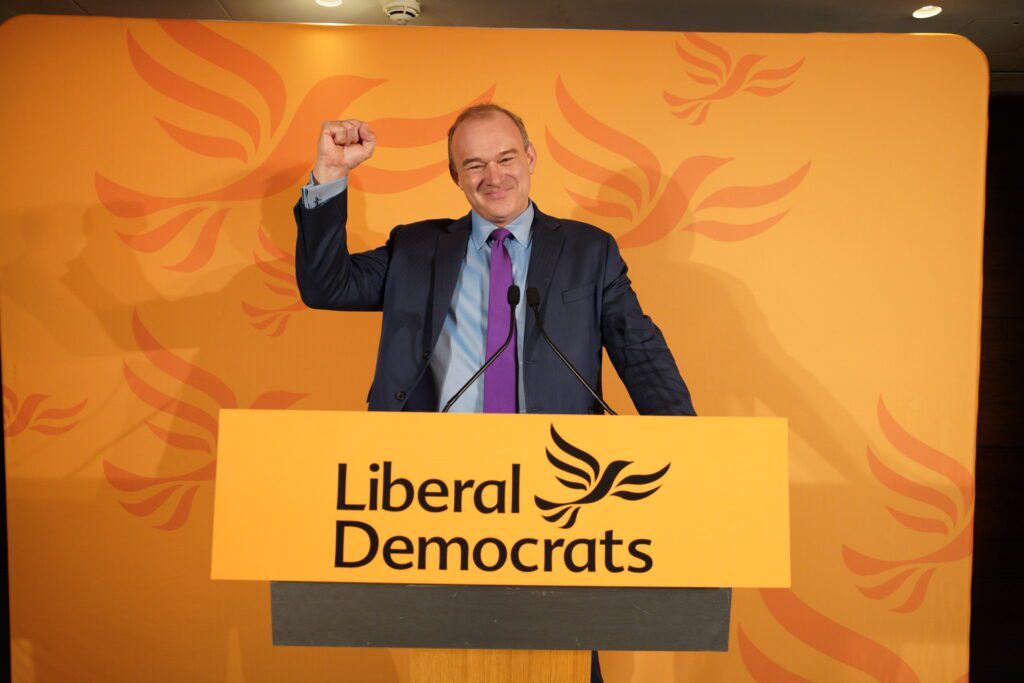With the insurgent Reform UK more than 10 points clear in the polls, Westminster’s established parties are scrambling for new ways to monitor and counter Nigel Farage’s rising force. Yesterday afternoon at their party conference in Brighton, the Liberal Democrats offered a glimpse of their strategy, Reform Watch.
Launched by party leader Sir Ed Davey in the wake of Reform’s success in the May 2025 local elections, and chaired by a group of 3 senior Lib Dem councillors – Leader of Hull City Council Mike Ross, Leader of the Durham County Council Opposition Amanda Hobden, and Leader of the Kent County Council Opposition Anthony Hooke – Reform Watch is a campaign calling on grass roots activists and councillors to report back to the party on the activities of Reform UK in their area.
On Monday afternoon, the initiative’s 3 chairs spoke with Tom Morrison, MP for Cheadle and the Liberal Democrats’ Deputy Chief Whip in Westminster, and took questions from party members about the scheme, the party’s future, and the potential threat of Reform.

All 3 panelists were highly critical of Reform, with Anthony Hooke claiming that Farage’s party are ‘building a record of failure,’ Mike Ross saying that he is ‘fundamentally opposed to everything Reform stand for,’ and Amanda Hobden accusing them of deliberately misleading people during this year’s local election campaign.
However, despite attacking the party itself, the panel avoided being overly critical of Reform voters, with Ross stating that Reform’s success is largely due to the failures of Labour and the Conservatives, and expressing understanding that people want an alternative to the current two party system, but stressing that it was imperative for the Lib Dems to convince the masses turning their back on Labour and the Tories that they, and not Reform, are the best alternative.
Morrison agrees with this sentiment, and claimed that of all the Westminster parties, the Liberal Democrats are ‘in the best place to tackle Reform head on.’
When it came to how this could be done, the panel had plenty to say, with Anthony Hooke saying that the key to beating Reform in local elections is campaigning on local, rather than national issues. Amanda Hobden added to Hooke’s point, accusing Reform of spending far too much campaigning effort in the build-up to May’s local elections focusing on national issues, rather than the local and regional matters that councils and local authorities actually have control over, expressing confusion as to why the Reform branch in her area campaigned on ‘stopping the boats,’ when there are no asylum seekers trying to cross the North Sea and enter Britain via County Durham.
Hobden also accused Reform of being deliberately misleading and ‘populist’ in their campaign, complaining that earlier in the year they accused the then-Lib Dem-led County Durham Council of having one of the largest debts of any council in the country, without factoring in the fact that they also had one of the highest populations of any council.
She also expressed dismay at the media’s coverage of Reform, calling on them to make sure that they are fair and transparent when reporting on the party, and ensuring that the screen time they give them is proportionate to the size of the party; Hobden claims that Reform, who at present only have 5 MPs in Westminster, receive far more media coverage than the Liberal Democrats did when they were in a similar position prior to last year’s general election; however this apparent disparity could arguably be justified based on the fact that Reform leader Nigel Farage is a far more well-known figure than Lib Dem leader Sir Ed Davey, who the panel were full of praise for.
At the very beginning of the panel, host Tom Morrison described him as ‘the UK’s most popular political leader,’ referring to YouGov polling which gives Sir Ed Davey a higher approval rating than Kemi Badenoch, Nigel Farage, or Sir Keir Starmer.
This polling is caveated by the fact that the Lib Dem leader is much less well-known than his 3 main competitors, however when asked whether this lack of name recognition could pose a problem for Davey and his party, the panel seemed dismissive, with Anthony Hooke claiming that when canvassing people often tell him how much they like his party’s leader. Mike Ross added that this relative lack of recognition when compared to other party leaders could work in Ed Davey’s favour, claiming that Nigel Farage’s status as one of Britain’s most famous politicians is actually a weakness for Reform, as most people are voting for Farage, not Reform, and thus without him the party will ‘crumble.’
Clearly, whilst the Liberal Democrats are certainly taking the rise of Reform and appearance of a new political rival seriously, they are also optimistic about their own prospects for the future. The mood from Brighton was not one of fear or despair, but rather one of determination and hope. They pointed to recent by-election victories and record-breaking local election results as proof that the Lib Dem message still resonates when delivered effectively.
Reform Watch, they stressed, is not simply a defensive tool but part of a broader effort to show voters a constructive, liberal alternative—one rooted in patriotism defined by service to communities rather than isolationism.
If the panel’s upbeat mood is any indication, the Liberal Democrats believe they have both the strategy and the resolve to turn voter dissatisfaction with the status quo into the continuation of their party’s resurgence. From the panel, the message was clear: Reform may be riding high in the polls today, but the Lib Dems are preparing for the long game and are convinced that they can come out on top.




